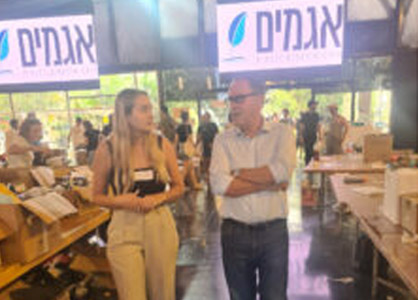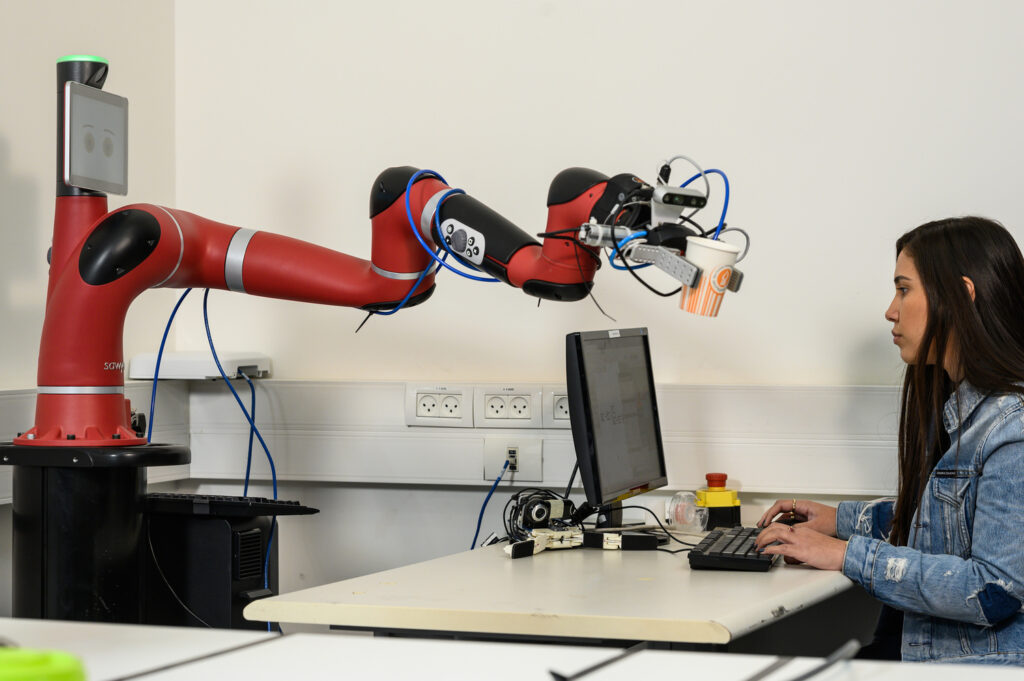
A Night at the Museum Promotes Israel’s South
A Night at the Museum Promotes Israel’s South
July 6, 2009
Negev Development & Community Programs, Social Sciences & Humanities
On a warm recent Monday night in Beer-Sheva, Israeli singer Efrat Gosh purred and squealed into a microphone in an impromptu imitation of Billie Holiday.
My man don’t love me, he treats me oh so mean,” she sang while puffing on her cigarette before a 720-person audience sprawled on the lawn of the Negev Museum of Art.
Gosh’s performance was part of a summer “Monday at the Museum” concert series cosponsored by the Jewish Federation of Central New Jersey, as part of an effort to revitalize Beer-Sheva’s Old City.
Built by the Ottomans in the early 1900s, the attractive stone buildings and streets of the Old City have deteriorated badly since several nearby shopping malls drained it of commerce. By day, the once vibrant streets generally see only a minimum of traffic and pedestrians.
At night, the dark and empty alleys can feel menacing. Yet after the concert, cafes were abuzz and the city’s legendary ice cream parlor was full.
Along with the federation, sponsors include the Or Movement, Ben-Gurion University, the city of Beer-Sheva, and the Kivunim company, which promotes culture in the city.
“Monday at the Museum” is the brainchild of Ben-Gurion University Hebrew literature Professor Nissim Calderon, who runs the University’s Ofek project, a program designed to mix students with Beer-Sheva residents. The concerts are a blend of singing and conversation led by Calderon.
“Rock and roll in Israel cultivated the image of the singer-songwriter, who writes his own music and lyrics and performs,” Calderon said. “So the concert is a chance to enjoy the music and also to understand the deeper cultural meaning.”
Now in its third year, the program keeps getting better, according to Kivunim’s Jacqueline Haliva, the concert producer. “We’ve gotten to a point where artists who didn’t want to come down in the first or second year are calling us up and asking to come down to Beer-Sheva,” she said.
Gosh — whose soulful voice and mop of black hair make her seem like a happier, Israeli version of the Jewish sensation Amy Winehouse — danced flamenco, sang operatic improvisations and ended the concert by taking her shoes off and skipping around the audience.
The Central federation’s support in Beer-Sheva is funneled through its Mack Ness Fund and the Or Movement for Settlement in the Negev, an Israeli NGO.
Or is behind a number of projects in the Old City this summer, including a pajama party for children at the Negev Museum, a youth comedy show and a weekly Wednesday festival on Smilansky Street, which is home to a popular coffee shop and an upscale restaurant.
These events dovetail with the federation’s goal of developing the Negev as a place for young people to find satisfying jobs, exciting city life and quality education for their children.
Aside from new infrastructure and housing projects, old buildings are being rehabilitated to create new accommodation, a riverside park is being created and the newly established Gateway to the Future center is running programs to draw tourists and expand employment.
A student hub
Central federation lay leader Norman Weinberg, who co-chairs the Ness Fund with Eleanor Rubin, pointed out that Beer-Sheva has the largest population of students in the country.
Besides improving the overall quality of life, the aim of development efforts, he said, is to forge a bond between those students and the region so that they stay on after graduating, rather than heading for places like Tel Aviv and Jerusalem.
The center of the country, he said, is over-populated, while the Negev — a completely undisputed part of Israel and 60 percent of its territory, is severely underpopulated. He quoted David Ben-Gurion as saying that “Jewish people need to live in the Negev.”
Central federation lay leaders Leonard and Frieda Posnock, in Israel for a family visit, were among those attending a recent concert in Beer- Sheva, part of cultural revitalization effort supported by the federation.
Jessica Mehlman, the federation’s assistant director of financial resource development, wrote in an e-mail: “Young people will not stay in the Negev to build businesses and families if there is nowhere for them to go and be social. The Old City program is seeking to make the Old City of Beer-Sheva into a SoHo of the South.”
In May, a conference in Miami, initiated by the Central federation, brought together all North American federations working in the Negev. There, Central federation announced it is redoubling its efforts in its Partnership 2000 city of Arad, as well as in Beer-Sheva and the Bedouin community of Tel Sheva.
“The Central federation, through the Ness Fund, was the first to jump into funding programs outside our ‘P2K’ bubble, to make a true impact on the region as a whole,” Mehlman said.
“We are seeing success, and the Miami Conference was about encouraging other North American federations to do the same.”
A spokesman for Beer-Sheva Mayor Rubik Danilovitch said the city has enthusiastically joined the federation’s efforts. “All these events are supplying a cultural life to Beer-Sheva that was really missing in past years,” he said.
Gosh, who has lived in Tel Aviv and its suburbs all her life, said she finds a special sense of serenity in Beer-Sheva. “There’s a warmth here, and you can feel it in the people,” she said.
For locals, the concerts provide a welcome weekly destination during the hot summer days. At 10 shekels ($2.50), tickets are affordable to nearly everyone in the city.
This year for the first time, the series will extend into August with four smaller events. Upcoming artists include balladeer Rona Keinan, surrealistic Asaf Amdurski, and Shlomi Shaban, known for his prowess in classical piano that translates to elaborate solos during his rock performances.
Masha Lidishensky, a behavioral science student at Ben-Gurion University, said Gosh was unique and down to earth. “She has an amazing voice,” said Lidishensky, 23. “The talk was a little long but it brought up things I didn’t know, like how she used to sing blues.”
Levi Dayan, 48, a computer engineer at BGU, said Gosh is “a little nuts but a lot of fun.”
The Old City is already improving, he said, adding that “there are restaurants and pubs and the city organizes activities; 10 years ago there was nothing here.”
Elaine Durbach contributed to this story.



